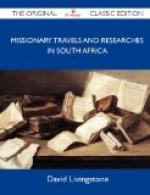There is not much knowledge of the Christian religion in either Congo or Angola, yet it is looked upon with a certain degree of favor. The prevalence of fever is probably the reason why no priest occupies a post in any part of the interior. They come on tours of visitation like that mentioned, and it is said that no expense is incurred, for all the people are ready not only to pay for their services, but also to furnish every article in their power gratuitously. In view of the desolate condition of this fine missionary field, it is more than probable that the presence of a few Protestants would soon provoke the priests, if not to love, to good works.
Chapter 22.
Leave Pungo Andongo—Extent of Portuguese Power—Meet Traders and Carriers—Red Ants; their fierce Attack; Usefulness; Numbers—Descend the Heights of Tala Mungongo—Fruit-trees in the Valley of Cassange—Edible Muscle—Birds—Cassange Village—Quinine and Cathory— Sickness of Captain Neves’ Infant—A Diviner thrashed—Death of the Child—Mourning—Loss of Life from the Ordeal—Wide-spread Superstitions—The Chieftainship—Charms—Receive Copies of the “Times”—Trading Pombeiros—Present for Matiamvo—Fever after westerly Winds—Capabilities of Angola for producing the raw Materials of English Manufacture—Trading Parties with Ivory—More Fever—A Hyaena’s Choice—Makololo Opinion of the Portuguese—Cypriano’s Debt—A Funeral—Dread of disembodied Spirits—Beautiful Morning Scenes— Crossing the Quango—Ambakistas called “The Jews of Angola”—Fashions of the Bashinje—Approach the Village of Sansawe—His Idea of Dignity—The Pombeiros’ Present—Long Detention—A




